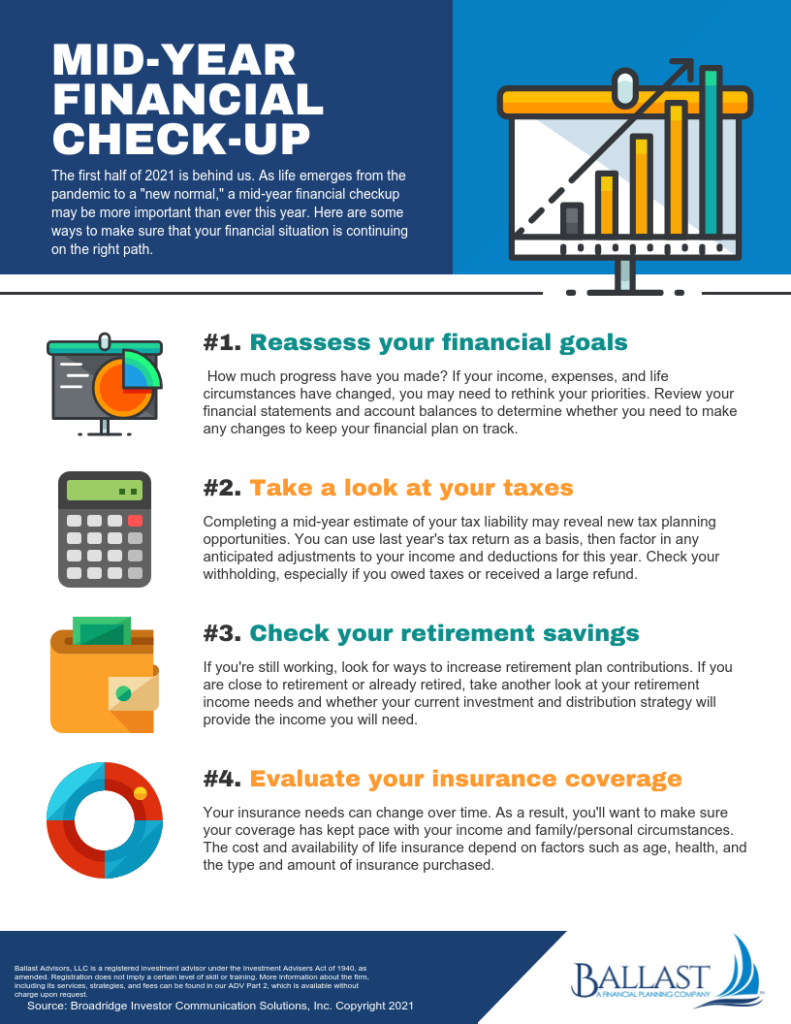The first half of 2021 is behind us. As life emerges from the pandemic to a “new normal,” a mid-year financial checkup may be more important than ever this year. Here are some ways to make sure that your financial situation is continuing on the right path.
Reassess your financial goals
At the beginning of the year, you may have set financial goals geared toward improving your financial situation. Perhaps you wanted to save more, spend less, or reduce your debt. How much progress have you made? If your income, expenses, and life circumstances have changed, you may need to rethink your priorities. Review your financial statements and account balances to determine whether you need to make any changes to keep your financial plan on track.
Take a look at your taxes
Completing a mid-year estimate of your tax liability may reveal new tax planning opportunities. You can use last year’s tax return as a basis, then factor in any anticipated adjustments to your income and deductions for this year. Check your withholding, especially if you owed taxes or received a large refund. Doing that now, rather than waiting until the end of the year, may help you avoid owing a big tax bill next year or overpaying taxes and giving Uncle Sam an interest-free loan. You can check your withholding by using the IRS Tax Withholding Estimator at irs.gov. If necessary, adjust the amount of federal or state income tax withheld from your paycheck by filing a new Form W-4 with your employer.
Check your retirement savings
If you’re still working, look for ways to increase retirement plan contributions. For example, if you receive a pay increase this year, you could contribute a higher percentage of your salary to your employer-sponsored retirement plan, such as a 401(k), 403(b), or 457(b) plan. For 2021, the contribution limit is $19,500, or $26,000 if you’re age 50 or older. If you are close to retirement or already retired, take another look at your retirement income needs and whether your current investment and distribution strategy will provide the income you will need.
Evaluate your insurance coverage
What are the deductibles and coverage limits of your homeowners/renters insurance policies? How much disability or life insurance coverage do you have? Your insurance needs can change over time. As a result, you’ll want to make sure your coverage has kept pace with your income and family/personal circumstances. The cost and availability of life insurance depend on factors such as age, health, and the type and amount of insurance purchased.
Ask questions
Finally, you should also ask yourself the following questions as part of your mid-year financial checkup:
• Do you have enough money in your emergency fund to cover unexpected expenses?
• Do you have money left in your flexible spending account?
• Are your beneficiary designations up-to-date?
• Have you checked your credit score recently?
• Do you need to create or update your will?
• When you review your portfolio, is your asset allocation still in line with your financial goals, time horizon, and tolerance for risk? Are any changes warranted?
Asset allocation is a method used to help manage investment risk; it does not guarantee a profit or protect against investment loss. All investing involves risk, including the possible loss of principal, and there is no guarantee that any investment strategy will be successful.
Prepared by Broadridge Investor Communication Solutions, Inc. Copyright 2021
IMPORTANT DISCLOSURES The opinions expressed herein are those of Ballast Advisors, LLC and are subject to change without notice. The third-party material presented is derived from sources Ballast Advisors consider to be reliable, but the accuracy and completeness cannot be guaranteed. Past performance is not indicative of future results. Nothing contained herein is an offer to purchase or sell any product. This material is for informational purposes only and should not be considered investment advice. Ballast Advisors reserve the right to modify its current investment strategies and techniques based on changing market dynamics or client needs. Broadridge Investor Communication Solutions, Inc. does not provide investment, tax, legal, or retirement advice or recommendations. The information presented here is not specific to any individual’s personal circumstances. To the extent that this material concerns tax matters, it is not intended or written to be used, and cannot be used, by a taxpayer for the purpose of avoiding penalties that may be imposed by law. Each taxpayer should seek independent advice from a tax professional based on his or her individual circumstances. These materials are provided for general information and educational purposes based upon publicly available information from sources believed to be reliable — we cannot assure the accuracy or completeness of these materials. The information in these materials may change at any time and without notice. Ballast Advisors, LLC is a registered investment advisor under the Investment Advisers Act of 1940, as amended. Registration does not imply a certain level of skill or training. More information about the firm, including its services, strategies, and fees can be found in our ADV Part 2, which is available without charge upon request.


